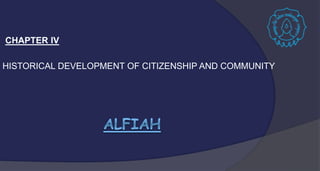
Christianity's Impact on Concepts of Citizenship and Community
- 1. CHAPTER IV HISTORICAL DEVELOPMENT OF CITIZENSHIP AND COMMUNITY
- 2. -As Christianity began to spread in the Western World, the Roman Empire responded with barbaric measures. -By 55-135 A.D., Epictetus answers the question, “What is a man?” as one who is a part of a civic community (polis). He is more specific in separating one’s faithfulness into two communities. Epictetus presaged what was to become a conflict in values. Allegiance first belonged to the community of Gods and men, and then to the (civic) community. -By the Third Century A.D., it is less easy being a good citizen. In 391 A.D., Emperor “Theodosius I made Christianity the official religion of the Empire.” Christianity demanded a different kind of loyalty. Instead of loyalty to the community or service to the state, Christianity emphasized loyalty to one’s private self and to the church community Christianity Effects Change in Concept of Citizenship
- 3. The Power of the Bishop. The development of the bishopric and the powers relegated to the bishop increased. The political and religious powers merged. Loyalty becomes relegated to the “city through the bishop and saint . . . .” The key person in this “Christian cultural-political development was the bishop.” As the influences of the bishop increased, the importance of citizenship and civic virtue waned. The bishop’s main interest was in creating Christians out of pagans rather than converting the pagan public to active civic citizenship. Interest in the public domain became equivalent to having interest in pagan ideas.
- 4. Romans and Germans. -In Gaul, the church dominated the learning institutions, while in Italy, the city was the main institution. However, in the plain of the Po, the northeastern Italian coastline region, civic institutions and civic virtue flourished. -Citizenship as an issue remained prevalent; however, due to the growth of the Roman Empire, interest in citizenship, as an exchange for allegiance and protection, continued to dominate the thinking on citizenship through the Middle Ages. Citizenship in the classical mode was eclipsed, blotted out. -Civic institutions survived one thousand years after Constantine’s reign in the Third and Fourth Century (285-337 A.D.,). The Byzantine era, from 1050 to 1150 A.D., witnessed the time of “great social mobility.
- 5. The Second Era--Two Principal Traditions of Citizenship The Renaissance Ideology In the next three centuries the citizenship construct survived in “two principal traditions.” The Renaissance ideology and the civic humanist institutions were given credence by the writings of Machiavelli and then onto others such as Harrington. James Harrington “thought it possible to create a perfectly stable and unchanging republic”. . . “by arranging a suitable balance of interests in the organization of the government through such devices as a separation of powers, division of the legislature, and rotation in office.” He is known for his “blueprint” for a perfect republic in his work entitled, The Commonwealth of Oceana. These ideas reached the shores of France where Rousseau embraced and embellished the concept of citizenship in the civic humanist tradition. Property rights and the acquisition of property as pursued by the medieval merchants and lawyers set the tone for the second citizenship
- 6. The Civic Humanist Tradition. -The second concept of citizenship was encouraged by the writings of “More, Montaigne, Bacon, Shakespeare, Hobbes, Locke, Franklin, and many others . . . .” -Bodin viewed citizenship in the promotion of subjectship to the monarchy -During the Middle Ages, the citizenship tradition continued to emphasize the exchange of protection for taxes and service between citizen and community in France. The Renaissance period followed in this tradition. Montesquieu’s writings stressed the importance of the role of citizen--defining citizenship within the realm of liberty and society- ”a life being lived under the rule of law.” -Rousseau discussed the new society, which was “to be based on civism, heroism, sacrifice, and equality.”
- 7. Philosophers, Hobbes and Locke, looked to the subject of citizen and citizenship not in the narrow legal sense but in the way the Ancient Greeks envisioned citizenship--as the form of civic virtue and civic consciousness of the community. They saw the individual as a moral, thinking being who reflected on society and acted on those demands and needs. Hobbsean thinking focused on the individual and the individual’s influence in society. Locke, on the other hand, seized upon the idea of the role of the individual and expanded that role to include the individual’s role in government and in property acquisition. During the 1700's, the moral side of citizenship is revived. The citizen, in the eyes of Montesquieu, is seen as “a worthy political figure.” Montesquieu’s citizen is similar to Locke’s in character--one who is law-abiding, productive, and a loyal subject.
- 8. Transvaluation Occurs. As we have seen the development of citizenship and community emerge out of Classical Greece and be transformed in Rome, we experienced a convergence with Christianity. cultivated. Along this strain of development converged the monarchical element. As these three doctrinal forces merged with each other, revolutions of spirit in the name of mankind and humanity occurred. The powers described as the church (religion), the monarchy, and the state, evolved in revolutionary terms to launch a new era. This is why, in the modern era, we have such difficulty with getting the idea of citizenship. Dewey, realizing this, developed a theory of democratic governance and citizenship that held that we can understand citizenship, and learn how to be citizens, only by doing it in the context of actual community processes. We can never get the idea of citizenship from our theoretical traditions about governance because, in effect, it has been lost to us. What we got in its place was citizenship through representative government
- 9. TERIMAKASIH